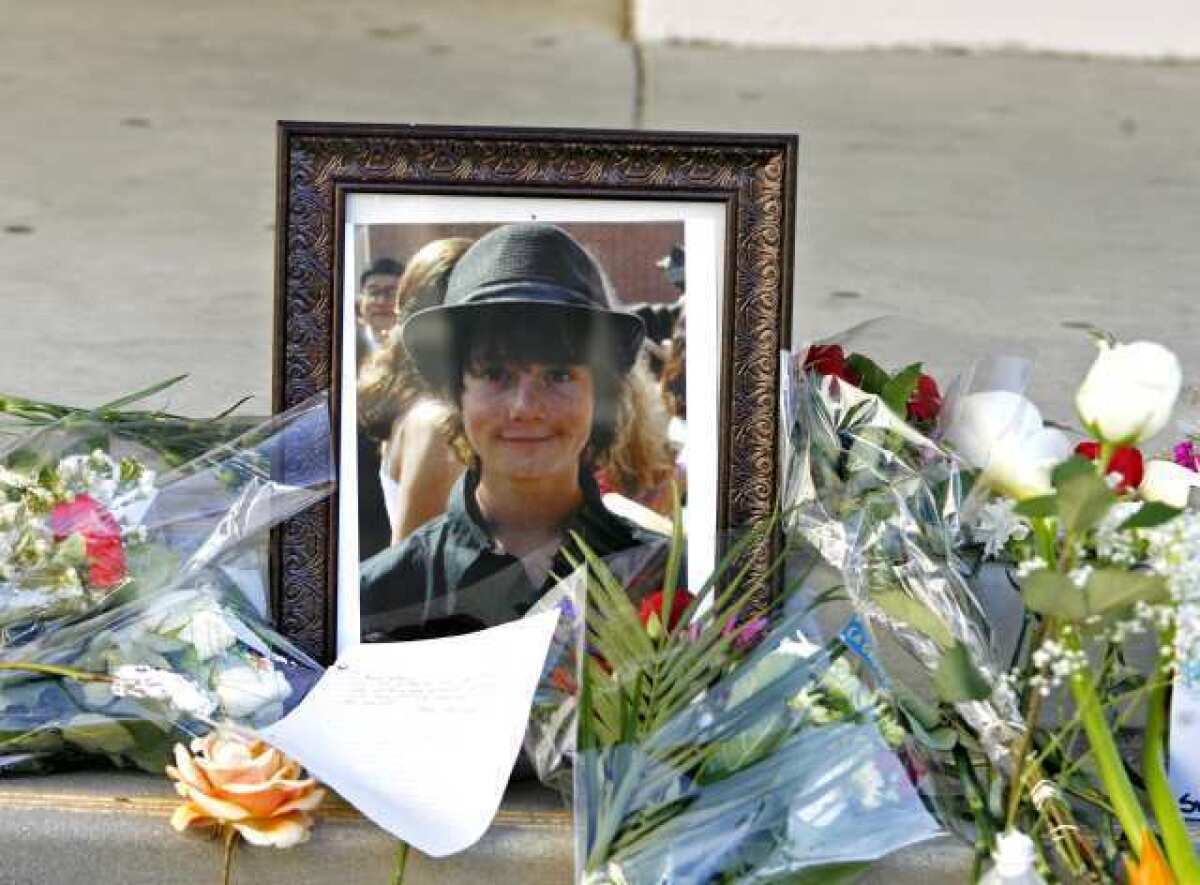Drew Ferraro case will not go to trial

- Share via
The case involving former Crescenta Valley High School student Drew Ferraro, who killed himself on campus in 2012 when he was 15 years old, will not go to trial as his parents’ attorneys had hoped, following a Superior Court judge’s ruling on Friday.
In February 2012, Drew took a running start from atop a three-story building on campus and jumped to his death. His parents — John and Deanna Ferraro — filed a $2-million wrongful-death lawsuit against Glendale Unified, alleging that bullying was a major factor in his death, and the school district failed to improve his situation at Crescenta Valley High.
However, Glendale Unified attorneys argued in court documents that the Ferraros’ claims were meritless, failing to show how the school district’s response to Drew’s harassment was the cause of his suicide.
During a hearing in Los Angeles County Superior Court in Burbank, Judge William Stewart granted Glendale Unified’s motion for a summary judgment. The case will not go to trial because he ruled the case lacks sufficient evidence by the Ferraros to prove that Drew’s suicide was directly linked to the inaction of Glendale school officials.
“The court spent more time on this than the rest of the calendar altogether,” Stewart said. “I can’t find anything to deny this motion…I can’t deny this…I even wrote one [tentative ruling] denying it…it just wasn’t right.”
In a statement Glendale Unified officials issued Friday afternoon, they said that although the judge ruled in favor of the school district, “It is not lost on the district that we still sympathize with the Ferraro family.”
It also stated, “This is a tragedy that has affected a family and an entire school community. Even though this ruling exonerates the school and the district personnel, the [Glendale Unified School District] does not want this decision to overshadow our continuing efforts to do everything we can for all our students, especially those in need.”
In October, the Ferraros’ attorneys — Stanley Lieber and Kathy Belous — had a psychiatrist Carole Lieberman give her take on Drew’s suicide.
In Lieberman’s deposition, she claimed Drew encountered “one taunt too many” during his English class the day he killed himself, which “sent him bolting out of the classroom, and up to the roof, where he jumped to his death.”
She also said Drew was “incessantly bullied” and that his “emotional struggles were invisible to the administrators, counselors, teachers and other staff” of the school until he killed himself, and “the school’s reckless disregard finally pushed him over the edge of his depression.”
But in his tentative ruling, Stewart attacked her lack of facts, writing, “Dr. Lieberman does not identify any facts upon which she supports her opinion that the alleged taunt in the English class triggered a suicidal ideation.”
He went on to write that there is no evidence a “taunt” occurred in class that day, and said in court it was not proven who allegedly ridiculed Drew.
“She’s basing it…on hearsay,” Stewart told the Ferraros’ attorneys of the alleged insult. “This is a missing fact that’s been missing since the beginning. Without that fact, everything just collapses.”
He also asked the Ferraros’ attorneys what it was that caused Drew to commit suicide.
“It was obviously the school environment,” Belous replied, who described it as “toxic.”
Lieber argued that Drew’s suicide was uncontrollable.
“Something set him off,” Lieber said and asked why the 15-year-old would show up to school that day, if he had planned to take his life.
“Why did he even go to class?” he asked.
Court records show Drew had been treated for depression. Two days before the teen’s 14th birthday in June 2010, a physician made notes regarding Drew’s mental health that read, “Feels depressed about school pressures and family issues. Has future plans and agreed to call if ever feels suicidal,” according to court records.
Neither Drew nor his parents reported any bullying incidents to the school after May 2011, according to court documents. However, in court depositions, one female classmate, when asked why she thought Drew killed himself, replied, “Because he was bullied.”
In February 2012, two days before Drew killed himself, he texted a friend, “I honestly think we could use an apocalypse... It would all just be over and I wouldn’t be hurting anyone with my death.”
After seeing the conversation, Drew’s mother confronted him.
“We talked about suicide being permanent and that it’s something you can’t take back and that he’s loved and he has a lot of friends,” she said in a court deposition.
She recalled Drew replying, “I know. I know. I’m not thinking about doing anything like that.”
“I asked him why he would talk like that. And he said, ‘It’s just hard being a teenager. It’s hard fitting in,’” she said, according to court records.
In response to Stewart’s ruling, Lieber told the judge, “We’ll let the court of appeal decide, I guess.”
After the hearing, Lieber said he was disappointed with the ruling because it delays potentially getting a trial.
“But I’m not disappointed in the fact that we still have that one last court of appeal. And I think we’re right, I really do,” he said. “I think the judge made a mistake, but he put a lot of time in — I don’t dispute that. And he’s a smart guy. I just think he missed it… I feel bad about the delay but [I’m] still optimistic.”